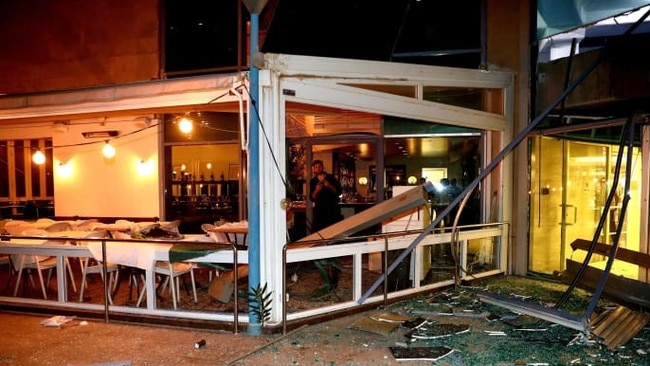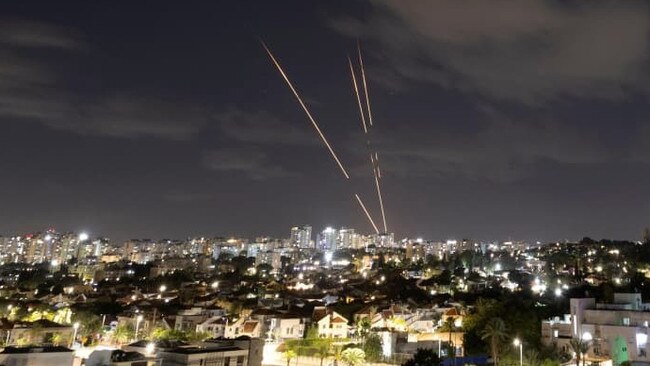Why did Israel attack Iran? Fresh test for long-time enemies
Israel’s strike back at Iran early Saturday further expands hostilities that have existed since 1979 and spiralled since the war in Gaza.

Israel struck back at Iran early Saturday, delivering a much-threatened response to this month’s 180-missile attack by Tehran and further expanding the hostilities that have spiralled out of the war in Gaza.
Israel had said it would respond forcefully after Iran fired a barrage of ballistic missiles at Israel, overwhelming its air defence on some sites at the start of October.
For its part, Iran had said it was retaliating for the deaths of an Iranian general in Beirut and the leaders of Tehran-backed militant groups, Hezbollah and Hamas.
The two countries have been foes since Iran’s revolution in 1979 brought a strict Islamic government antagonistic to Washington’s interests, with Ayatollah Ruhollah Khomeini calling Israel “Little Satan” to the US’s “Great Satan”.
The conflict between the two countries heated up after Iran’s nuclear program became public in 2002, with Israel carrying out sabotage campaigns and targeted killings to undermine the program.
Iranian leaders have threatened to destroy Israel.
Israeli response to Iran’s attack to set course of widening war
As Israel weighed up how to respond to Tehran’s latest missile barrage, it could have taken a page from its previous playbook when, after days of deliberation, its military targeted a single Iranian military site.
Few expected Israel’s response to be as narrow this time, posing a fresh test as the Biden administration seeks to avoid a new spiral of escalation.
“The US already lacks sufficient diplomatic leverage to compel a ceasefire in Gaza and Lebanon,” said Jonathan Panikoff, a former US intelligence officer now with the Atlantic Council, a Washington-based think tank.

In April, Iran launched more than 180 ballistic missiles at Israel, which appears determined to carry out a robust response, “The challenge of avoiding a regional war is at its most difficult point since Oct. 7,” Panikoff added.
The Biden administration has been trying to damp Israel’s ardour to strike back too forcefully by emphasising that Iran’s missile attack was once again thwarted by Israeli and US missile defences
While acknowledging Iran’s missile barrage represented “a significant escalation,” national security adviser Jake Sullivan had emphasised that it “appears to have been defeated and ineffective.”
The Biden administration has vowed that the US will ensure that Iran faces “severe consequences” regardless of how Israel responds, a step US officials have yet to spell out but which some analysts said could mean stepped-up sanctions enforcement.
Yet none of that appeared likely to stay Israel’s hand – a point Prime Minister Benjamin Netanyahu underscored when he declared that Iran had “made a big mistake” and “will pay for it.”
Unlike with Iran’s last missile attack, Israel doesn’t need to fear that a strike against Iran would spark a major clash with Hezbollah. Israel’s air and ground offensive against Hezbollah, and its outsize missile force, has greatly diminished its capabilities.
One contingency Israel needs to game out is Iran’s response. Tehran has said its missile barrage was retaliation for the killing of Hassan Nasrallah, the Hezbollah leader, and has threatened “crushing attacks” if Israel strikes back.
After Iran’s missile and drone attack in April left Israel virtually unscathed, President Biden pressed Netanyahu to “take the win” and limit its retaliation. Israel appeared to listen and targeted the radar for an S-300 antimissile system near Isfahan that was protecting a nearby airfield and was thought by military analysts to be part of the defence for the Natanz nuclear facility.
Israel’s response wasn’t expected to be as constrained this time, though some former officials expect it to show some restraint in taking military action against Iran.
An Israeli attack against Iran’s nuclear facilities or oil infrastructure, some analysts said, would greatly raise the stakes. Such an airstrike could provoke Tehran to launch a larger missile barrage, orchestrate terrorist attacks against Israeli interests abroad and step up its nuclear program, hastening Iran’s path to a bomb.
“Israel will seek to reinforce the idea that its technological superiority and military skill allow it to strike any target in Iran,” said Norman Roule, who served as the top US intelligence officer on Iran from 2008 to 2017.

But Israel is likely to avoid striking targets that could spark a full-scale war with Iran, Roule said.
“A war with Iran would require the political, economic and military support, if not participation by the United States,” he added. “Israel no doubt recognises that Washington has no interest in engaging in such a conflict. “
Iran, for its part, was looking for a way to lash out at its foe without igniting the full-fledged regional war it has sought to avoid for four decades.
The presence on Israel’s border of Hezbollah, a US-designated terrorist organisation, has widely been seen as Iran’s primary insurance policy against an Israeli attack at its nuclear facilities or its leadership in Tehran.
Now, with Hezbollah reeling from a devastating Israeli military campaign, Iran sought to find a way to show it was still serious about protecting its “axis of resistance” without inviting retaliation that could jeopardise its own security, analysts said.
“Iran’s leadership has increasingly been facing a lose-lose proposition: Watch its allies and interests severely weakened and do nothing, or retaliate, as it now has, and roll the dice on the consequences,” said Ali Vaez, director of the Iran Project at the International Crisis Group.
Having watched Israel pummel Hezbollah, Tehran might have opted for a “calculated provocation” rather than standing down, said Walter Posch, a senior researcher with the National Defense Academy in Vienna.
“In the end, decision makers in Tehran settled for the idea that restraint would not help to avoid a bigger confrontation anyway,” said Posch.
In planning its attack, Tehran has had to reckon with how deeply Israeli intelligence has penetrated Iranian security and that of some of its regional allies. That could explain why Iran’s barrage wasn’t accompanied by missile or drone attacks by the Houthis, Hamas, Hezbollah or Iraqi militias, which would have required advance coordination and potentially tipped off Israel’s spies.
Afshon Ostovar, an expert on Iran’s military at the Naval Postgraduate School in Monterey, Calif., questioned whether Iran’s attack served much of a purpose beyond the “faint hope” that it might deter Israel from attacking Iranian forces and its regional allies.
“This was revenge. Plain and simple,” he said. “Iran has played itself into a corner.”
Shayndi Raice contributed to this article.
Dow Jones Newswires






To join the conversation, please log in. Don't have an account? Register
Join the conversation, you are commenting as Logout